Brent Hartinger's Blog, page 12
November 11, 2013
GEOGRAPHY CLUB, the Movie, Opens This Weekend In Theaters and on VOD!
So the movie adaptation of my first novel Geography Club opens in limited release this weekend. Is it playing in your city? Find out here.
But no matter where you live, the movie is also playing video-on-demand. Which means that if you have access to cable, or iTunes, or Amazon, or any video outlet, you can catch the movie wherever you are.
Let me know what you think. I was really more of a by-stander in the creation of the movie itself, so you can’t really hurt my feelings. So tell me what you really thought! I’d like to hear your honest opinion.
As for me, I really did like it. And I can almost guarantee that if you liked the book, you’ll like the movie too.
 Send to Kindle
Send to KindleThe post GEOGRAPHY CLUB, the Movie, Opens This Weekend In Theaters and on VOD! appeared first on Brent's Brain.

November 10, 2013
They Turned My Book Into a Movie. Here’s What I Learned
What did I learn?
The story starts when I graduated from college and decided to try to make a career writing novels and screenplays. It was the early 90s, and one of my first books was a young adult novel about a gay teen named Russel Middlebrook and his misfit friends. It was an extremely personal topic for me, because I had been a gay teenager, and I had also co-founded one of the United States’ very first gay teen support groups, in 1990.
For ten years, I (and later my agent, Jennifer DeChiara) tried to sell the book to publishers. A lot of editors wanted to buy it, but ultimately I heard the same thing over and over again: “I really like this, but the accountants at my publishing house tell me there’s no market for a book about gay teenagers.”
In early 2001, a brave editor at HarperCollins named Steve Fraser bought the book, even over the objections of the accountants there, who were just as certain as everyone else that the project would flop.
The book finally came out in early 2003. Two weeks after it was released, it had already gone into a third printing. In other words, all those accountants and all those publishing houses who said there was no market for a book about gay teens? They didn’t know what the hell they were talking about.
Because the book was a hit, I was given the opportunity to write lots of other books. I even turned Geography Club into a series, the Russel Middlebrook Series.
Better still, we had a lot of movie producers interested in developing the first book as a feature film or TV series. Different companies optioned it and took it around Hollywood. But this was long before Glee, and time and again, the answer was, “We really like this, but there’s no market for a movie or a TV show about gay teenagers.”
It got to the point where the producer said to me, “I literally think this thing has been rejected by every studio, network, and financing company in town.”
But two producers, Frederick Levy and Bryan Leder (and later, their producing partners Michael Huffington and Anthony Bretti) wouldn’t take “no” for an answer. And finally, ten years after the book was published, they got the movie made — with pretty much a dream cast too (including Hairspray’s Nikki Blonsky, Suburgatory‘s Ana Gasteyer, Glee‘s Alex Newell, The Lying Game‘s Allie Gonino, Scott Bakula, and a bunch of up-and-coming young actors).
Even better, the finished movie’s really good (I saw it last week; you can see the trailer if you scroll down and look to your right). There’s even talk of doing the sequel as a movie too should the first movie prove to be a hit.
So what’s the take-away from all this? Listen to your heart, not the nay-sayers? Never give up your dreams?
Maybe, but the fact is, if certain people hadn’t been willing to move heaven and earth for me and my projects at key points in my career, my book and the movie never would have happened, and right now I’d probably be asking, “Would you like fries with that?” That’s kind of sobering when I think about it.
But if I’ve learned anything at all over the years about selling books and making movies, it’s this: there are really only two ways books get published and movies ever get made:
(1) Create a book or movie project that everyone thinks will make them a lot of money. This is a lot easier said than done, since you never know what other books and movies will be flops and hits right around the time your project is being pitched. Talent counts for something here, but I think this is mostly just timing and luck.
(2) Create a book or movie project that at least few people feel really passionately about — so passionately that they’ll keep working on it even as everyone else tells them they’re crazy, that it’s certain to flop, and that they’re wasting their time.
Basically, the choice is: go with your brain or go with your heart.
On one hand, going with your heart is trickier: do you really want to devote years of your life to a project that a lot of editors and producers won’t even want to read? On the other hand, it’s a lot easier than trying to predict exactly where the crazy pop culture market and zeitgeist are headed. All you have to do is ask yourself: what exactly do I personally feel the most passionate about? What project would I desperately like to see that doesn’t already exist?
If you’d asked me my opinion earlier in my career, in the midst of all the rejection for Geography Club the book and later the movie, I would have said, “Do strategy number one! Go with your brain! Write that dystopian zombie-vampire book! There at least you have a chance for success! Strategy number two is for suckers and fools!” (And then I would have added, “Would you like fries with that?”)
But I’ve been in the business for a while now, and I’ve seen editors and producers get very excited about my work, only to lose interest when the project didn’t turn out to be an instant hit or get immediate financing.
I also think it’s very interesting the only movie projects I’m associated with that are actually getting made – Geography Club and another film I wrote that will hopefully be out next year — are the passion projects. In other words, strategy number two.
There’s another benefit to choosing strategy number two: you’re working with people who aren’t just in it for the money. They’re in it for the passion. Which means — at least in my experience — they’re far less likely to be jerks. Since you end up so intimately involved with these folks, and since your words and your career are so closely associated with them, this not a small thing. I’m very proud to call these colleagues my friends.
The screenwriter William Goldman once famously said about Hollywood, “No one knows anything,” and it’s probably the most accurate thing ever said about that town (it’s completely true of New York publishing as well).
No one knows anything. Sometimes a project flies high, sometimes it completely flops (and usually it lands somewhere in that infuriating middle area in between).
And no matter what anyone says, no matter how much money they spend or who is involved, no one can predict for sure which projects will be successful and which not. That’s what makes a career in the arts so frustrating — and also so magical.
Making movies and publishing books are ultimately businesses: they exist to make money. As a result, a lot of the people in those industries like to talk like success is all about the brain. They want to believe they have some control over the money they’re spending.
Do they? Maybe. But in my case, success turned out to be all about the heart.
 Send to Kindle
Send to KindleThe post They Turned My Book Into a Movie. Here’s What I Learned appeared first on Brent's Brain.

November 7, 2013
Photos From My Set Visit to GEOGRAPHY CLUB, the Movie
So a year ago last June, I flew down to Los Angeles for four days to watch the filming of Geography Club, the movie based on my book (to be released on November 15th, 2013, in select theaters and on video on demand).
The most interesting thing I saw was the football stadium scene. In the book, it’s the scene where Russel joins the baseball team to be closer to Kevin, and he ends up sort of accidentally hitting a homerun. The producers of the movie decided football would be more cinematic, so they changed sports. And sure enough, the resulting scene is spectacular — one of the best in the whole movie.
As I watched them film it, I couldn’t help but feel a little bit like how the Egyptian pharaohs must have felt watching them build the pyramids. There were over a thousand extras! There was a marching band, two football teams, two cheerleading squads, and about a zillion crew members. All to film a movie version of this little book I cranked out almost fifteen years ago? If I’d known everyone was going to make such a fuss, I think I would have worked on it a lot longer!
Anyway, here are the pictures I took.
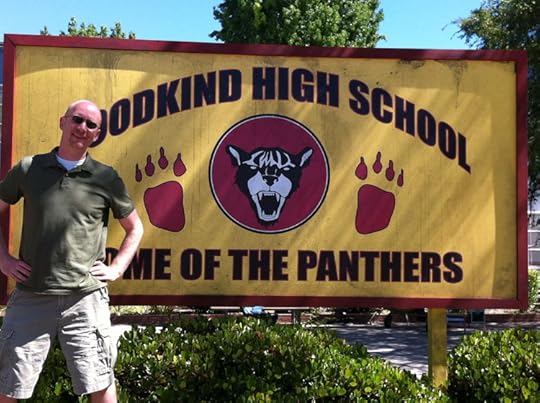
I remember when I thought up the name "Goodkind." I was trying to be ironic (because much of the school isn't good OR kind), but I've always wondered if it was too much.

Cameron Deane Stewart plays Russel. Right before we took this picture, he said, "This is the most un-Russel scene in the whole movie!" That's when I knew: (a) he got the character, and (b) I liked him a lot.
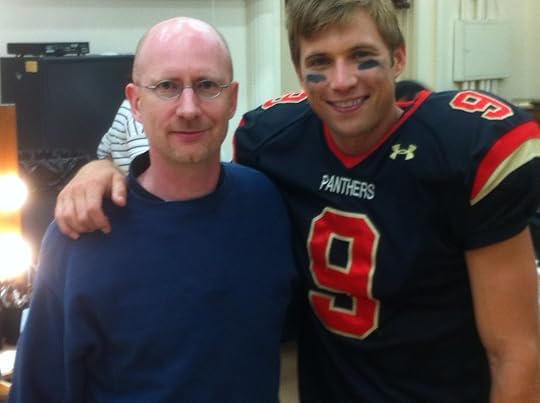
Justin Deeley, another great guy, plays Kevin. Seeing the actors on set, I'm so glad I don't have a job where I have to be the focus of all that attention.

Alex Newell plays Ike, and he's wonderful. But I honestly don't think I understood what a phenomenon GLEE is until I saw Alex interacting with the extras in the crowd. People went NUTS for him!

Nikki Blonsky, the lead in the movie HAIRSPRAY, was such a fan of GEOGRAPHY CLUB the book that she contacted the producers saying she'd play any part. They rewrote the role of Terese for her, and she's terrific.
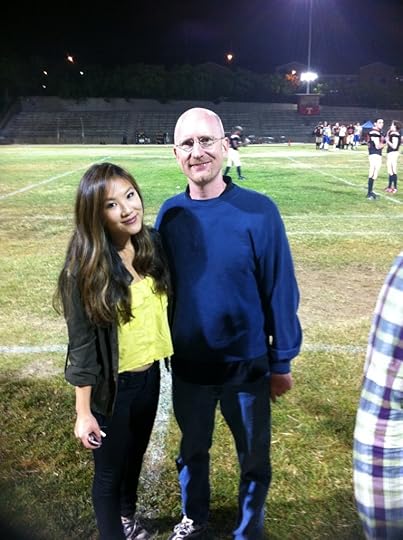
When I first met Ally Maki, who plays Min, this stunningly beautiful woman walked into the room. And I thought, "Huh. I always thought Min was attractive, but that's not exactly how I pictured her." A day later, I saw her in hair and make-up, and I watched her acting. And like magic, Min magically appeared before my eyes!

Allie Ganino (from TV's THE LYING GAME) plays Kimberly. Frankly, the character is a bitch, but Allie had me hysterics on set, saying so much in each take just by rolling her eyes or sucking on a lollipop.

Andrew Caldwell, who plays Gunnar, told me that when he told people in high school he wanted to become an actor, they all said he was too fat. That made him more determined than ever. Now he has a very successful acting career, and I'm sure their lives all suck!

Teo Olivares plays Brian Bund, which I think is one of the most difficult roles in the movie. How do you give dignity to an object of ridicule? But boy, does Teo pull it off.
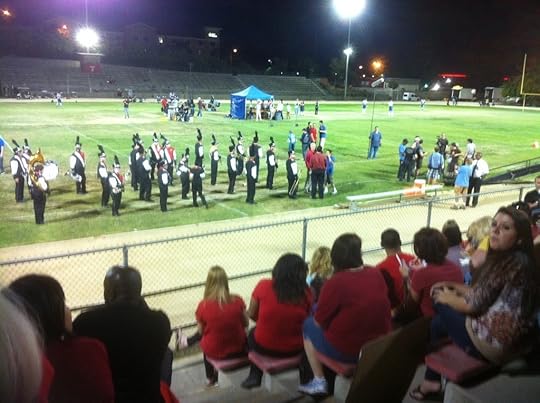
My view from the stadium seats. Jesus, all this for my little book?! Is it too late to fix all the things I desperately wish I'd written differently?

My agent Jennifer DeChiara, who is the reason (a) the book got published in the first place, and (b) a movie got made. No, seriously. She made it all happen.
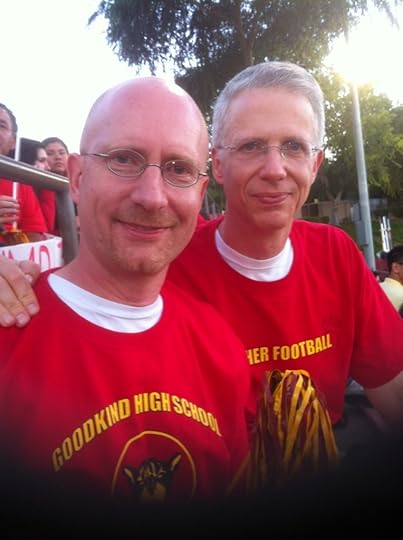
My incredible partner Michael. All the great things in my life have been so much better having him to share them with.

Behind the scenes! But I confess that by 5 AM, I was ready to get some sleep...
 Send to Kindle
Send to KindleThe post Photos From My Set Visit to GEOGRAPHY CLUB, the Movie appeared first on Brent's Brain.

October 21, 2013
Some Thoughts on Diversity: Wow, It’s Complicated
I participated in a pretty interesting and rousing panel last year at the Kidlitosphere Conference (with Justina Chen, Sarah Ryan, Lee Wind, and Sarah Stevenson) on the subject of “diversity” — racial and otherwise — in YA fiction.
I’m re-posting some of my thoughts:
Talk is cheap. Everyone says, “I’m all for diversity!” But being in favor of diversity in theory is literally pointless. In today’s world, the only way it happens is if you consciously make it happen. We all need to be aware of this issue — in our own works and in the works of others. If the characters you’re writing (and reading) are exactly like you, it’s worth asking yourself, “Why might that be?”
Writing minority characters can be a thankless job. If it’s a leading character, your project may very well be put in a different category by agents, publishers, and booksellers, than if the character is straight and white: it might be put in a marginalizing “niche.” Non-minority readers may be more reluctant to read it, but you might also face extra scrutiny from minority folks, especially if your project ends up being high-profile. The Help was criticized by some for being written (and told, in part, from the point of view of) a white character. Meanwhile, books like Push (which became the movie Precious) and The Absolutely True Diary of a Part-Time Indian are criticized, even by other minorities, for exposing (or, some say, exaggerating) negative aspects of those communities (to appeal to whites, some say). Since nobody needs these headaches, I wish people would remember that, ultimately, these are just stories, and no story is going to definitively change the world for the better or the worse, nor can any one story be all things to all people.
Along those lines, there is no one minority experience of anyone — not of blacks, not of gays, not of the disabled. What we’re talking about are the experiences of individuals — individual characters, in fact. I really do get why minorities are protective of the way they’re portrayed — they’ve often been oppressed, ridiculed, and/or stereotyped, usually for centuries. But again, when we’re talking about a book or movie, we’re talking about individual characters, not entire groups. No one is “representative” of anything. And besides, art is about making connections and finding the emotional heart in a character and situation anyway; it’s not about literal “truth.”
That said, if you’re not a member of a minority, and you’re writing a minority character, you have a responsibility to do your research about that community and get the details right. More importantly, you have a responsibility to be aware of existing media stereotypes and minority tropes and cliches about that community: they often loom very, very large, and they’re usually the source of much frustration in minority communities. If you choose to employ minority stereotypes or tropes anyway, you should absolutely know that you’re doing it and also know exactly why. If you don’t do your research on these issues, you really do deserve to be criticized.
That said, don’t be scared of minority characters and stories, even if you’re not a member of that community. It’s sometimes the case that a person outside a minority community (but very familiar with it) can offer an extremely interesting perspective on that community. None of the three writers involved with the movie Brokeback Mountain (the original prose writer or the two screenwriters) were gay, but they were able to create a uniquely and profoundly “gay” story, and also somehow find that story’s universal “heart”; as a result, they created a story that appealed to a mainstream audience in a way that no gay love story ever had. Sometimes some minority writers are too close to a community, or too lost in details or politics, to find a way to tell a story in such a universal way. I’m reminded how, in the 19th century, the political writer Alexander de Tocqueville, a Frenchman, was able to see America so very clearly. Mainstream popularity is not the end-all and be-all of every writer and every story, but such stories do have a place in the world. Brokeback Mountain made a difference.
The reason why there is so much controversy and discussion about minority portrayals, especially high profile, big budget, or leading portrayals, is because they’re still so rare. These projects contain the hopes and dreams of thousands if not millions of people; it makes sense those people would be heavily invested in them. The only way to make minority stories less of a big, angst-y, complicated deal is for there to be more stories told for and about minorities of all kinds.
I wish minority communities, including my own GLBT community, would be more reluctant to level charges of “racism,” “homophobia,” or “sell out”, at least against projects that might be flawed but are still pretty clearly well-meaning and well-intentioned. I’m all for vigorous debate and criticism, but we’re all in this together, and the writer of even a flawed or stereotypical character is not necessarily the “enemy,” and cannot and should not be held responsible for all of society’s sins. Furthermore, criticism should always be about the work in question, never the motives or prejudices of the author, which no one can ever really know anyway.
Like I said, it’s a complicated topic!
 Send to Kindle
Send to KindleThe post Some Thoughts on Diversity: Wow, It’s Complicated appeared first on Brent's Brain.

October 17, 2013
So You Want to Write a Gay Young Adult Novel?
Check out this interview I did over at TheBacklot.com, where I basically reveal all I know about YA publishing, and the LGBT market in particular!
 Send to Kindle
Send to KindleThe post So You Want to Write a Gay Young Adult Novel? appeared first on Brent's Brain.

October 15, 2013
ENTERTAINMENT TONIGHT Says GEOGRAPHY CLUB Movie is “So Culturally Important” it is “Required Viewing”
Entertainment Tonight has weighed in on the new movie adaptation of my book, to be released in theaters and on video-on-demand on November 15th:
Every year sees the release of one film so culturally important it should be required viewing. This year, that film is Geography Club.
Whoa! Not bad, eh?
It’s a good film, folks. If you liked the book(s), I’m certain you’ll like the movie too.
 Send to Kindle
Send to KindleThe post ENTERTAINMENT TONIGHT Says GEOGRAPHY CLUB Movie is “So Culturally Important” it is “Required Viewing” appeared first on Brent's Brain.

ENTERTAINMENT WEEKLY Says GEOGRAPHY CLUB Movie is “So Culturally Important” it is “Required Viewing”
Entertainment Weekly has weighed in on the new movie adaptation of my book, to be released in theaters and on video-on-demand on November 15th:
Every year sees the release of one film so culturally important it should be required viewing. This year, that film is Geography Club.
Whoa! Not bad, eh?
It’s a good film, folks. If you liked the book(s), I’m certain you’ll like the movie too.
 Send to Kindle
Send to KindleThe post ENTERTAINMENT WEEKLY Says GEOGRAPHY CLUB Movie is “So Culturally Important” it is “Required Viewing” appeared first on Brent's Brain.

September 19, 2013
The New GEOGRAPHY CLUB Movie Poster!
So here’s the new movie poster for the Geography Club movie, now scheduled to be released nationally on November 15th. I really, really like it!
 Send to Kindle
Send to KindleThe post The New GEOGRAPHY CLUB Movie Poster! appeared first on Brent's Brain.

September 5, 2013
Is YA Too Trend-Driven?
There is nothing new under the sun, true, but does that mean that every other YA book has to feel so much like last year’s big break-out hit?
You know what I’m talking about: first, it was vampires, then fairytale retellings, then paranormal romance in general, then angels and zombies, then dystopian.
Boy, was there a lot of dystopian! Now I hear tell that the thriller is back in style, though I’m sure it will end up being a very specific kind of thriller.
I’m not dissing individual authors. Those authors that are supposedly “ripping off” some other author who came before? Usually their books were written years before — they had to be, in order to take advance of the trend’s exploding popularity. And let’s face it: a lot of times, these “second wave” books are a lot better than the first break-out hit.
Plus, hey, we all gotta eat.
This is about the industry, and the fact that teen literature is a HUGE business these days.
This is exactly what happens when an entertainment medium becomes wildly popular – when it attracts the attention of huge corporations. Exploiting a trend or a fad until it’s completely tapped out makes for a fantastic business model. And in general, people will always like what they know, what is familiar.
But let’s be clear: this is a creative trap. If you want to know what’s at the end of that road, look to the Hollywood movie studio system: virtually everything they now do is a superhero movie, a sequel, a remake, or a reboot.
No, seriously. Of last year’s top ten grossing movies, seven of them are one of those things.
Creativity is literally almost completely dead in the studio system. A lot of the producers and writers who work there are very talented, but they’re now openly discouraged from being interesting or challenging.
Instead, it’s now independent filmmaking — not the six major movie studios — where you now find almost all of the intelligence, originality, and the risk-taking in movies today.
Or look to television. Not to the broadcast networks, which operate a lot like the major movie studios: mostly broad, bland programming that’s meant to appeal to the widest possible audience.
But cable television? That’s a whole different animal, especially “pay” cable television. Writers are encouraged to take wild risks here, to create intelligent, attention-getting shows because their business model requires more passionate and highly motivated audiences.
So where is YA publishing headed? Like the movie studios and broadcast networks, or indie filmmakers and cable networks?
If the corporations get their way — if money is the most important consideration — YA publishing will continue to become more like the studios and networks. And most of us who enjoy YA have already heard all the warning signs: declining advances for debut authors, mid-list authors unceremoniously dumped when their books don’t move tens of thousands of copies in hardcover.
The word has long gone out to agents: give us books that can be turned into movie franchises!
Welcome to the big leagues, boys and girls. Make us lots of money, now, or move along.
And yet, despite all the handwringing, the YA genre is still producing more books, and better books, than it ever has. I still think there’s too much groupthink going on, too much cynical bottom-lining. But beyond the lead titles, publishers are giving us some pretty amazing diversity. For the time being, YA publishers are acting more like cable channels than broadcast networks or movie studios.
I’ve been thinking about all this a lot because my latest book, The Elephant of Surprise, is the story of a gay boy who has a passionate romance with a guy he first meets rooting around in a Dumpster. The guy’s a “freegan,” someone who’s voluntarily choosing to be homeless. He and his friends eat roadkill and squat in houses and explore abandoned buildings.
Needless to say, “romance” and “Dumpster diving” are not themes you usually see associated together. This is also a pretty far cry from most other LGBT teen books. But that was exactly the point. I wanted to do something really unusual and attention-getting and different — not like any other YA book you’ve read before.
Did I pull it off? Well, obviously that’s for readers to decide.
The greater point is I’m just happy to write in genre where writers are still allowed to let their characters be as weird, dorky, and unconventional as they are.
Let’s hope that never changes.
 Send to Kindle
Send to KindleThe post Is YA Too Trend-Driven? appeared first on Brent's Brain.

September 4, 2013
On Writing “Incidentally Gay” Books and Characters
When it comes to LGBT issues, especially LGBT teen issues, things have changed SO MUCH in the last ten years. Naturally, the genre of LGBT teen lit has changed a lot too.
When I look at my own work, Geography Club (2003) was very much about the experience of a gay kid in high school and the process of coming out. The sequel, The Order of the Poison Oak (2005), was about what comes next: what exactly does it mean to be out? How does being gay relate to the greater world and others who are “different”? The next sequel, Double Feature (2007), was, in part, about the different ways of dealing with ones parents, who may or may not be supportive (Min’s were supportive, Russel’s were not).
In short, the first three books in the Russel Middlebrook Series weren’t only about LGBT teen issues, but those issues factored in pretty heavily.
With the latest book in the series, The Elephant of Surprise (2013), I wanted to do something totally different: make it not about LGBT issues in any way.
Yes, most of the characters in the book are still gay and bi, and there’s a fair bit of same-sex romance. But the main story is about something that doesn’t have anything to do with LGBT issues. It’s about environmentalism, consumerism, and love, but it’s not about any specific gay “issue.”
As I was writing it, I thought this was kinda sorta revolutionary: a gay teen book that isn’t about being gay, and that includes absolutely no gay angst whatsoever.
It’s an “incidentally gay” story: the characters just happen to be gay. Which is, you know, kinda like how it’s getting to be in life these days: someone is gay, that’s important, but it’s often only a very small part of who they are. The gay issue needed to be resolved, but once it is, it’s pretty much over and done with.
Of course I’m not the first LGBT writer to do this, not even the first writer of LGBT teen fiction; it’s long been vogue in LGBT genre fiction, in fantasy or sci-fi, where it’s easy to imagine a whole world where being gay is a non-issue.
Incidentally gay storytelling is also sort of inevitable when you’re writing a book series (or working on a teen TV series like Glee). You cover the important “coming out” issues, but then you’re forced to ask yourself: “What comes next?”
Even so, I do think the incidentally gay story or character is still somewhat unusual in realistic teen fiction. There are marketing considerations, after all.
Which, frankly, is why I was honestly surprised when only a single critic picked up on what I was doing (that I know of — I don’t read all reviews).
But the readers? As usual, a lot of them got it. Many people saw right away what I was going for and really seemed to appreciate it.
I’m not one of those writers who likes to “explain” what they were going for (which is why the book came out in February, and I’m only writing this blog post now!).
Then again, hey, this is my blog, and I figured there might be some folks who were interested in my thinking.
 Send to Kindle
Send to KindleThe post On Writing “Incidentally Gay” Books and Characters appeared first on Brent's Brain.





